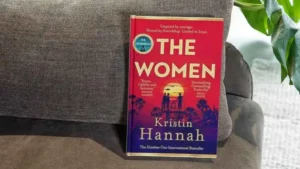Broken Country by Clare Leslie Hall is a captivating blend of historical drama, romance, and mystery set against the pastoral backdrop of 1960s rural England.
This debut novel has quickly gained attention for its sweeping love story intertwined with the pulse of a thriller
At its heart, the book follows Beth, a farmer’s wife in a close-knit village, whose world is upended when her first love, Gabriel, suddenly returns after a decade away.
Gabriel’s reappearance – along with his young son – reopens old wounds and secrets that Beth thought were long buried, forcing her to confront feelings and choices from her past.
The novel begins with a jarring incident: a gunshot on Beth’s farm that unexpectedly links her present to her past.
Beth’s brother-in-law shoots a stray dog threatening their sheep, only to discover the dog belonged to Gabriel, the very man who “broke her heart years ago”
Gabriel’s return to the village ignites gossip and tension among the locals, who long suspected “nothing good would come of [his] return”.
As Beth’s happy life with her gentle husband Frank is thrown into turmoil, the stage is set for a story that toggles between past and present, unraveling a decades-old love triangle and a brewing tragedy.
Broken Country has been lauded for its vivid setting and emotional depth, drawing readers in with a promise of romance, intrigue, and the haunting consequences of secrets.
In-Depth Analysis of the Book’s Central Theme
At its core, Broken Country explores how the choices we make in the name of love can reverberate across time, shaping our identities and destinies.
Clare Leslie Hall delves into the far-reaching legacy of first love, illustrating how Beth’s youthful romance with Gabriel left an indelible mark on her psyche.
Beth’s journey is essentially a meditation on love and loss – she is a woman torn between the pull of a passionate past and the commitments of the present.
Through Beth’s eyes, the novel examines the painful trade-offs between selfishness and selflessness, as she grapples with desires that conflict with her duties as a wife and mother.
The author uses Beth’s internal conflict to highlight how one moment of youthful passion can blossom into lifelong what-ifs, suggesting that the past, if unresolved, can fracture a person’s sense of self much like a “broken country” of the heart.
Another central theme is the consequence of secrets and suppressed truths. The village setting serves as a microcosm where everyone’s history is entwined, yet much remains unspoken.
Beth and Frank’s marriage has been built on maintaining peace by keeping certain truths buried. Gabriel’s arrival acts as a catalyst that brings long-dormant secrets and resentments back to the surface.
Hall effectively uses the alternating timelines – shifting between Beth’s idyllic yet fraught teenage summer with Gabriel and the turbulent present—to show how time does not heal all wounds when honesty is missing.
Each decision made by the characters is “driven by the one before it, stretching [Beth] to her breaking point”.
The tragic events that unfold underscore the novel’s central message: every choice has a cost, and the burden of guilt or regret can span years, even generations.
In Broken Country, love is portrayed as both a destructive and a redemptive force – capable of causing heartbreak and even violence, but also offering a path to healing if confronted with courage and truth.
Applying the Lessons in Real Life
1. Embracing Honesty and Confronting the Past
One powerful lesson from Broken Country is the importance of facing one’s past openly and honestly. In the novel, Beth learns that avoiding difficult conversations and hiding truths only prolongs pain.
Her reluctance to address her lingering feelings for Gabriel and the secrets in her marriage with Frank creates a tension that eventually boils over.
In real life, this translates to the idea that unresolved emotions and secrets can haunt us. Just as Beth must summon the courage to acknowledge her old love and grief, we too are often better off confronting past mistakes or lost loves head-on.
Open communication and honesty – no matter how painful – can prevent misunderstandings and prevent past issues from breaking our present “country” (our current life situation).
The story encourages readers to reflect on their own lives: Are there buried feelings or truths we need to face in order to move forward? Beth’s experience shows that confronting the past is the first step toward healing and personal freedom.
2. Understanding the Consequences of Choices
Another lesson vividly illustrated in the book is that every choice carries consequences, and we must be prepared to accept them. Throughout Broken Country, small decisions – both in the past and present – accumulate and lead to dramatic outcomes.
For example, Beth’s youthful choice to pursue a forbidden romance with Gabriel sets off a chain of events that will shape her entire life.
In the present timeline, each character’s action, whether it’s a moment of jealousy, a lie told to a loved one, or a moment of courage, directly influences the tragedy or redemption that follows.
The real-life takeaway is clear: our actions and decisions, especially those made in moments of passion or fear, can have long-term impacts on our lives and the lives of others.
By recognizing this, we are reminded to be more mindful and intentional in our decisions.
The novel urges readers to consider the weight of their choices – be it in relationships, family, or career – and to think about the kind of legacy those choices might leave.
Just as Beth must live with the outcomes of her decisions, we too write our life stories one choice at a time, for better or for worse.
3. The Power of Forgiveness and Healing
Broken Country also imparts a lesson about forgiveness – of oneself and others – as a path to healing.
Beth’s story is steeped in grief: she mourns her deceased son, the loss of her first love, and later, the shattering of the calm life she built.
Much of her journey involves forgiving herself for the regrets she harbors and forgiving those who have hurt her, intentionally or not.
In the novel, forgiveness is not easy; it comes after soul-searching and facing painful truths.
However, when Beth begins to forgive – accepting the choices she made and the people who made them – she finds a measure of peace and clarity.
The real-life parallel is the understanding that holding onto resentment and guilt can leave us stuck in the past. Letting go, while difficult, can be profoundly freeing.
The book encourages readers to look at their own lives and consider if there are old grudges, guilt, or shame that need to be released.
By forgiving others or ourselves, we reclaim power over our own story. Just as broken land can be restored, Broken Country shows that broken hearts and lives can mend when we allow forgiveness and understanding to pave the way forward.
Similar Concepts and Comparisons
1. Reminiscent of Classic Love Tragedies
The themes and setting of Broken Country echo the tone of classic literary tragedies about forbidden love and social divides.
Readers familiar with L.P. Hartley’s The Go-Between or Ian McEwan’s Atonement will notice similar threads running through Hall’s narrative.
Like those classics, Broken Country is set in a world where class differences and societal expectations significantly shape the characters’ fates.
Beth, a farmer’s daughter with academic aspirations, and Gabriel, a young man from a wealthier family, mirror the star-crossed lovers trope seen in many classic stories.
The novel pays homage to these earlier works by portraying a love affair that is both passionate and ill-fated, set against a vividly rendered historical backdrop.
Additionally, the way a single impulsive act or misunderstanding can alter the course of many lives in Broken Country is strongly reminiscent of these classic tragedies.
For instance, just as Atonement hinges on a split-second decision that leads to lifelong regret, Broken Country builds toward a pivotal moment of reckoning born from years of hidden emotions.
Hall’s work stands on its own, but it proudly sits in the tradition of these tales of love, guilt, and irreversible consequences, inviting comparisons to the literary greats that explored how one moment of fate can echo for decades.
2. A Modern Blend of Romance and Mystery
Broken Country has drawn comparisons to contemporary novels that mix deep emotional drama with suspenseful mystery, offering something for fans of both genres.
In many ways, it will appeal to readers who enjoyed Where the Crawdads Sing by Delia Owens or The Paper Palace by Miranda Cowley Heller, as it similarly combines a vividly described natural setting with intense personal relationships and dark secrets.
Like those modern hits, Broken Country features a murder investigation entwined with a love story, creating dual layers of tension.
The question of “who killed the farmer?” fuels the plot’s suspense, much as the mystery in Crawdads kept readers guessing.
At the same time, the emotional turmoil Beth faces – torn between her dependable husband and her magnetic first love – provides the kind of heart-wrenching romantic dilemma that made The Paper Palace so compelling.
Hall’s novel carves out its own space by toggling between past and present, a technique that adds richness to the narrative much like other popular dual-timeline stories.
This approach allows readers to slowly uncover how youthful passions simmered into present-day conflicts.
In comparison to similar works, Broken Country distinguishes itself with its distinctly English rural atmosphere and historical period detail, almost as if Thomas Hardy’s pastoral dramas met a modern psychological thriller.
Yet all these stories share a common thread: they show how secrets in relationships can fester and lead to explosive revelations.
Fans of genre-blending novels will find Broken Country delivers a satisfying mix of emotional depth and page-turning intrigue, standing shoulder to shoulder with recent beloved love-and-suspense sagas.
The Book’s Contemporary Relevance
Although Broken Country is set in the late 1960s, its themes resonate strongly with contemporary readers.
One reason is that the emotional challenges faced by the characters are timeless.
The novel deals with issues like coping with grief, navigating complicated relationships, and the struggle between following one’s heart versus fulfilling one’s obligations.
These are dilemmas that people still face today. For instance, Beth’s conflict between personal happiness and societal/familial expectations reflects the ongoing conversation about individual fulfillment versus duty that many modern readers can relate to.
In an era where discussions about mental health and personal identity are at the forefront, Beth’s journey – working through trauma and rediscovering who she truly wants to be – feels especially relevant.
Her internal battle to reconcile “the woman she once was” with “the woman she has become” mirrors the experience of anyone who has had to let go of youthful dreams and come to terms with the reality of their adult life.
It prompts us to ask: How much do our past experiences define us, and can we break free of them to redefine ourselves?
The novel’s exploration of secrets and community gossip also holds a mirror to contemporary society.
In Beth’s small village, news travels fast and judgments are harsh – much like our modern world of social media where privacy is scarce and public opinion can be swift and unforgiving.
Broken Country highlights the pressures of living under scrutiny and the fear of scandal, which, though depicted in a mid-20th-century context, feel pertinent in today’s connected world.
Moreover, the gender dynamics and class issues presented subtly in the story invite reflection on progress (or lack thereof) in current times.
Beth’s limited opportunities as a young woman in the 1950s and 60s underscore how far society has come in terms of women’s rights and choices, while also reminding us that echoes of those limitations persist.
Ultimately, the book’s focus on love, loyalty, and moral choices transcends its historical setting.
It reinforces that the core questions it raises – about how we choose between passion and responsibility, truth and comfort, self and society – are as pressing now as they ever were.
In that sense, Broken Country speaks to our current moment by showing that the human heart’s trials and triumphs are a bridge between past and present.
Conclusion and Recommendation
Broken Country is a beautifully crafted novel that succeeds on multiple levels: as an evocative historical piece, a suspenseful mystery, and a moving love story.
Clare Leslie Hall’s writing brings the Dorset countryside to life, making the setting a character in itself with its lush descriptions of fields and farms and the ever-present sense of both beauty and isolation.
The characters are nuanced and flawed, which makes their journey all the more relatable and engrossing.
By the final chapters, the reader is not only invested in uncovering the truth behind the book’s central mystery, but also deeply emotionally invested in Beth’s fate and the outcome of her impossible choice.
The pacing balances introspective moments with bursts of shocking revelation, so you’re never far from a new discovery or a heartfelt exchange.
There is a poignancy to the story that may leave you contemplating your own life choices and “what ifs,” which is a testament to the book’s emotional impact.
I highly recommend Broken Country to readers who enjoy genre-blending novels with depth.
If you are a fan of love stories that don’t shy away from real-life complications, or mysteries that are driven by character as much as plot, this book will likely captivate you.
It’s perfect for book clubs and solo readers alike, as it provides plenty of topics to discuss: from the ethics of the characters’ decisions to the historical context of the setting.
While the novel deals with heavy themes like loss and betrayal, it also offers hope and insight, making the journey feel worthwhile.
In the end, Broken Country leaves a lasting impression as a story about how people break and heal, how a community can both support and stifle, and how confronting the past is essential to reclaiming one’s future.
It’s a thought-provoking and emotional read that will appeal to a broad audience, and it firmly establishes Clare Leslie Hall as a noteworthy new voice in fiction.

- Title: Broken Country
- Author: Clare Leslie Hall
- Publication Year: 2025
- Publisher: Simon & Schuster
- Page Count: 320 pages
- Genre: Historical Fiction / Mystery / Romance
Why You Should Read Broken Country
In summary, Broken Country is more than just a tale of star-crossed lovers – it’s a multilayered story that will appeal to your heart and mind in equal measure.
You should read this book because it delivers an immersive reading experience: the suspense of a whodunit, the passion of a romance, and the richness of a historical drama all come together seamlessly.
Clare Leslie Hall’s insightful storytelling offers not only entertainment but also meaningful reflections on life’s big questions- love and loss, right and wrong, past and present.
Few novels manage to be page-turners while also stirring deep emotions, but Broken Country achieves that balance effortlessly.
By the time you turn the final page, you’ll likely find yourself moved by Beth’s story and pondering the delicate interplay of fate and choice in your own life.
Broken Country is a book that stays with you, and that is why it deserves a spot on your reading list.

Andrea Moura
Literary Critic and Columnist for the Book Review Blog



